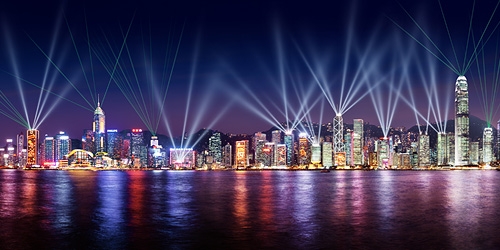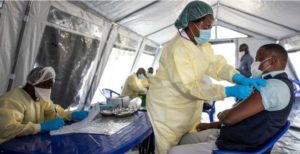China issues White Paper, offers backing for Hong Kong’s prosperity

Beijing : The Chinese Central Government published a white paper detailing the “one country, two systems” practice in Hong Kong Special Administrative Region (HKSAR), stressing the policy as a basic state policy despite new circumstances.
Put forward by late Chinese leader Deng Xiaoping in the early 1980s, the “one country, two systems” policy was aimed to realize the peaceful reunification of the country.It means there is only but one China and under this premise the mainland adheres to socialist system while Hong Kong, Macao and Taiwan may retain their capitalist systems over a long time to come. The policy was first applied to solve the question of Hong Kong.
The implementation of the principle of “one country, two systems” in the HKSAR has achieved widely recognized success, said the white paper, published by the State Council Information Office under the title “The Practice of the ‘One Country, Two Systems’ Policy in the Hong Kong Special Administrative Region”.
The white paper said the policy enjoys growing popularity in Hong Kong, winning the wholehearted support from Hong Kong compatriots as well as people in all other parts of China. It is also thought highly by the international community.
The policy has ensured Hong Kong’s smooth return to the motherland on July 1, 1997, and at the same time, the HKSAR was established and the Basic Law came into effect. Hong Kong entered a new epoch characterized by “one country, two systems,” “Hong Kong people governing Hong Kong” and a high degree of autonomy, the white paper said.
After the return to the motherland, Hong Kong made new achievements one after another, as its residents’ fundamental rights and freedoms are fully protected, the democratic political system has been steadily promoted.
The HKSAR has maintained steady economic growth, its social programs have been further enhanced, and Hong Kong’s international exchanges and its international influence have further expanded, the white paper said.
The Chinese mainland has provided “solid backing” for Hong Kong’ s prosperity and stability over the years, by helping the special administrative region defuse risks and strengthening competitiveness according to the white paper.
By the end of 2013, some 129 million mainland residents have visited Hong Kong under the Individual Visit Scheme, said the white paper .
Currently, the mainland is the largest trading partner of Hong Kong, while Hong Kong is the mainland’s most important trading partner, a key export market and the mainland’s largest off-shore financial center.
According to Hong Kong statistics, the trade volume between Hong Kong and the mainland reached 3.89 trillion Hong Kong dollars in 2013, 3.5 times that of 1997.In addition, the mainland and Hong Kong are also each other’s largest source of overseas direct investment.
Full Text: The Practice of the “One Country, Two Systems” Policy in the Hong Kong Special Administrative Region
The Information Office of the State Council, or China’s Cabinet, issued a white paper on the practice of the “one country, two systems” policy in Hong Kong on June 10, 2014
Following is the full text:
The Practice of the “One Country, Two Systems” Policy in the Hong Kong Special Administrative Region
Information Office of the State Council
The People’s Republic of China
June 2014, Beijing
Contents
Foreword
I. Hong Kong’s Smooth Return to China
II. Establishment of the Special Administrative Region System in Hong Kong
III. Comprehensive Progress Made in Various Undertakings in the HKSAR
IV. Efforts Made by the Central Government to Ensure the Prosperity and Development of the HKSAR
V. Fully and Accurately Understanding and Implementing the Policy of “One Country, Two Systems”
Conclusion
Appendix
Foreword
“One country, two systems” is a basic state policy the Chinese government has adopted to realize the peaceful reunification of the country. Following this principle, the Chinese government successfully solved the question of Hong Kong through diplomatic negotiations with the British government, and resumed the exercise of sovereignty over Hong Kong on July 1, 1997, fulfilling the common aspiration of the Chinese people for the recovery of Hong Kong. As a result, Hong Kong got rid of colonial rule and returned to the embrace of the motherland, and embarked on the broad road of common development with the mainland, as they complemented each other’s advantages.
Hong Kong’s return to the motherland turned “one country, two systems” from a scientific concept into vivid reality. The central government strictly adheres to the Basic Law of Hong Kong, earnestly performs its constitutional duties and stands firm in supporting the administration of the chief executive and the government of the Hong Kong Special Administrative Region (HKSAR) in accordance with the law. The HKSAR exercises a high degree of autonomy in accordance with the law, and is vested with executive, legislative and independent judicial power, including that of final adjudication. The previous capitalist system and way of life remain unchanged, and most laws continue to apply. Hong Kong continues to prosper, its society remains stable, and full development is being witnessed in all undertakings. The “one country, two systems” policy enjoys growing popularity in Hong Kong, winning the wholehearted support from Hong Kong compatriots as well as people in all other parts of China. It is also thought highly by the international community.
“One country, two systems” is a new domain in which we constantly explore new possibilities and make new progress in pioneering spirit. A summary of the policy’s implementation in the HKSAR, and a comprehensive and correct understanding and implementation of the policy will prove useful for safeguarding China’s sovereignty, security and development interests, for maintaining long-term prosperity and stability in Hong Kong, and for further promoting the “one country, two systems” practice along the correct track of development.
I. Hong Kong’s Smooth Return to China
In the early 1980s, China’s state leader Deng Xiaoping put forward the scientific concept known as “one country, two systems” in an effort to realize the peaceful reunification of China, and this ingenious design was first applied to solve the question of Hong Kong. According to Deng Xiaoping, “one country, two systems” means there is only but one China and under this premise the mainland adheres to the socialist system while Hong Kong, Macau and Taiwan may retain their capitalist systems over a long time to come.
On December 4, 1982, the Fifth Session of the Fifth National People’s Congress (NPC) endorsed a new Constitution of the People’s Republic of China. Its Article 31 provides, “The state may establish special administrative regions when necessary. The systems to be instituted in special administrative regions shall be prescribed by law enacted by the National People’s Congress in the light of the specific conditions.” Giving expression to the “one country, two systems” concept, this Article provides the constitutional basis for the establishment of special administrative regions in certain areas that adopt different social systems and different policies from those on the mainland, as the Chinese government makes efforts to realize the peaceful reunification of China. After in-depth investigations and research, the Chinese government formulated 12 basic policies regarding the question of Hong Kong, known as the “12 Principles,” in early 1983.
The main contents were:
(1) The Chinese government decided to resume the exercise of sovereignty over Hong Kong as of July 1, 1997.
(2) After resuming the exercise of sovereignty over Hong Kong, the central government would establish a special administrative region in Hong Kong in accordance with the provisions in Article 31 of the Constitution. The Hong Kong Special Administrative Region would be directly under the authority of the Central People’s Government and would enjoy a high degree of autonomy.
(3) The HKSAR would be vested with legislative and independent judicial power, including that of final adjudication. The laws, decrees and regulations currently in force in Hong Kong would remain basically unchanged.
(4) The government of the HKSAR would be composed of local inhabitants. The principal officials would be selected by election or through consultations held locally and be appointed by the Central People’s Government. Those previously working in the public and police services in the government departments of Hong Kong may remain in employment. British and other foreign nationals may also be employed to serve as advisers to government departments of the HKSAR.
(5) The current social and economic systems in Hong Kong would remain unchanged, and so would the life-style. Freedoms, including those of speech, of the press, of assembly, of association, of travel, of movement, of correspondence, and of religious belief would be ensured in the HKSAR. Private property, ownership of enterprises, legitimate right of inheritance and foreign investment would be protected by law.
(6) The HKSAR would retain the status of a free port and a separate customs territory.
(7) The HKSAR would retain the status of a financial center, and its markets for foreign exchange, gold, securities and futures would continue. There would continue to be a free flow of capital, and the Hong Kong dollar would continue to circulate and remain freely convertible.
(8) The HKSAR would have independent finances.
(9) The HKSAR may establish mutually beneficial economic relations with the United Kingdom, whose economic interests in Hong Kong would be given due regard.
(10) Using the name “Hong Kong, China,” the HKSAR may on its own maintain and develop economic and cultural relations and conclude relevant agreements with states, regions and relevant international organizations. The government of the HKSAR may itself issue travel documents for entry into and exit from Hong Kong.
(11) The maintenance of public order in the HKSAR would be the responsibility of the government of the HKSAR.And
(12) the above-stated policies would be stipulated in the Basic Law of the HKSAR by the NPC of the People’s Republic of China (PRC), and they would remain unchanged for 50 years.
Courtesy : Xinhua
June 10,2014















